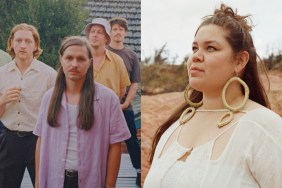It’s that time of year again – everyone is gearing up to get their festivus spirit on and looking forward to the best of the summer music line up. One of the biggest folk festivals is about to kick off again – Woodford Folk Festival starts this Monday the 27th of December and runs until the 1st of January. With 636 Artists and Presenters appearing this year, Music Feeds sat down and asked Program Manager, Chloe Goodyear, about running Woodford and what makes it a different large scale festival from all the others banging around
MF: Tell us about Woodford, how is it different to other festivals?
CG: I think this question is a tricky one as it kind of implies all other festivals are the same! There are a few elements I think make Woodford unique in the festival landscape: we hold it on our own beautiful land, annually, rather than moving into a space that’s used for other events; it’s run largely due to the efforts of a huge volunteer workforce and that creates a really unique atmosphere; the programme has a broad appeal rather than focusing on one genre or age group; and finally, it’s got to be one of the largest, longest, live-in festivals in Australia so has a real village feel. There’s a great feeling of community because of the combination of all of those elements, and it’s all set against the backdrop of a world-class programme.
MF: The energy around Woodford has always been one of positivity and acceptance, how have you maintained that?
CG: It’s fantastic to be asked a question like that and lovely to think that the Festival has that reputation. With Woodford depending almost entirely on the goodwill and creativity of the volunteer workforce, the generosity of the artists who come along and contribute to the week and the good intentions of the festivillians, it’s self-perpetuating, in a way. Our director Bill Hauritz ensures that there’s a place for everyone at Woodford is very high on his agenda and he works hard to make sure that we all remember that – and we in turn pass it on. There are a lot of people going out of their way to give at Woodford, and the naturally creates a pretty positive energy, I think.
MF: The festival itself is quite large, yet you never feel like you’re in the grip of some Big Day Out like monster, how do you maintain that intimate feel?
CG: We try to work really hard with the programme to maintain comfortable levels in the venues and ensure that there’s a good traffic flow around the site. The site itself is also very large, and the whole number of people are rarely in the one place at the one time. Festival organizers also watch ticket sales really, really closely to try to make sure that our amenities are going to be sufficient for the site – so if you buy your tickets early you help us to plan! We also really like intimate venues so try to make sure we have a good spread of those against venues like the Amphitheatre. It’s impossible to feel like you’re at a major rock concert if you’re watching a puppet show in a venue built for 25 people.
MF: Having been around for as long as it has, how do you keep up such a high level of excellence?
Again, what a lovely question to be asked – this one’s a bit difficult to answer without sounding like we’re blowing on a big trumpet! Any excellence that we achieve is entirely due to the hard work of the people involved – the volunteers, the people attending the festival themselves – and definitely the artists. If you’re talking purely in terms of the programme, we try to give our artists the best experience that we can while they’re here. We really value what they do and we know that the circumstances that we offer aren’t necessarily ‘industry’ standard – no flashy greenrooms, no private transport. Because we create the programme largely out of an Expressions of Interest process, it’s almost fair to say that the artists themselves are creating the programme – being attracted to wanting to be a part of the festival and putting on really, really fantastic shows. And generally, across the whole event I think that the ‘excellence’ comes because the person changing the toilet paper or moving the garbage or getting the amps on and off the stage is doing it because they genuinely care and know how valued their contribution is to the whole show. That said, we know we make mistakes and we are always trying to correct them and do better for the next year.
MF: Would you say you try to outdo yourself each year or is it a case of working toward longevity and consistency?
CG: Both. We look at the previous festival and look for what worked and what didn’t, but again, because of the Expressions of Interest process, a whole new programme slant emerges between February and May simply because of the people and bands who are applying to be a part of it. We try to create a programme that rings true for us in accord with our 500 Year Plan, and we try to create opportunities to celebrate and promote what we love and what we hope for, and look at elements that we think endanger us and focus on those, too – so we can avoid them or examine them. So it’s half planned and half organic, but longevity is definitely high on our list. As for consistency – we want to be consistent about quality, the welcome that we provide, and making sure that we operate with integrity, but we don’t necessarily see that translating into the same venues, layouts or artists each year.
MF: Is there anything particularly special about this year’s festival?
Of course! (An easier question might have been ‘what’s not special?’) It’s our 25th anniversary so it’s a total festival bonanza – I think that even the original team is kind of surprised that we’ve all actually made it this far, so it’s a great occasion. There are so many special moments at the festival that will be highlighted by this milestone – the 3 Minute Silence, New Year’s Eve in the Amphitheatre… it’s very difficult to pull out one particular thing in a programme of a couple of thousand discreet shows.
MF: Environmentalism has always been a part of the festival, can you tell us about some of the way the festival stays green and promotes sustainability?
CG: The GREENhouse programme is a very strong part of the festival (and also very, very popular) and focuses on environmental issues. Every decision made is underpinned by our Environmental policy with our 500 Year plan as the vision.
Since we moved to the Woodford festival site in 1987, there have been 92,000 trees planted during our annual Planting Weekend, the trees have grown beautifully and created a beautiful shady parkland and campgrounds. 140 nest boxes have been installed and the site has orchid, bush foods and butterfly specialists. In 2009 we installed a revolutionary waste-water treatment plant on site, so all waste water is treated through an environmentally sustainable system, released into a series of dams and then used for irrigation. We recycle just about everything including green waste in the campgrounds.
MF: With this year’s festival only days away now, any ideas of where it will be heading in future years?
CG: We’d all love to keep having the opportunity to do what we do annually, and to be able to get better at it – working with great people to throw a great party at the end of every year and developing Woodfordia as one of Australia’s most beautiful parklands, dedicated to music, art and humanity!
Woodford Folk Festival running from Monday the December 27th to January 1st.
Tickets from here












